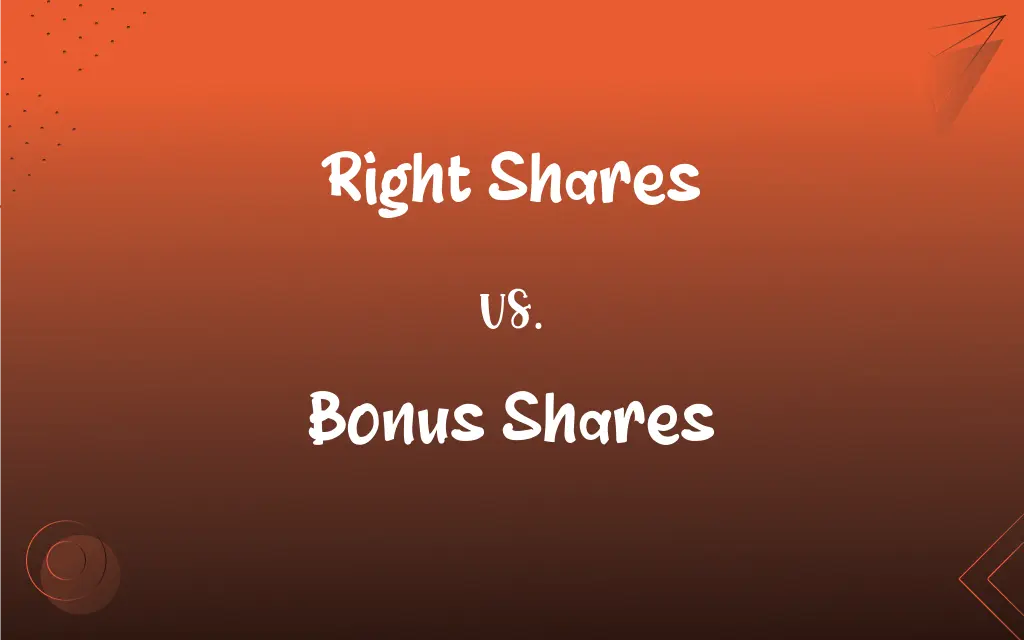Right Shares vs. Bonus Shares: What's the Difference?
Edited by Harlon Moss || By Janet White || Published on November 23, 2023
"Right Shares" are offered to existing shareholders at a discounted price, while "Bonus Shares" are given free based on existing holdings.

Key Differences
"Right Shares" are essentially an invitation extended to current shareholders to purchase additional new shares at a discount. This allows shareholders to buy more shares before they're offered to the general public. On the contrary, "Bonus Shares" don’t require any additional payment; they are free shares given to shareholders based on the number of shares they already own.
When a company needs to raise capital, "Right Shares" come into play, offering current shareholders the chance to maintain their proportionate ownership. This contrasts with "Bonus Shares", which are issued from the company's accumulated earnings and are essentially a conversion of retained earnings into stock, not really raising fresh capital.
The concept of "Right Shares" is about providing shareholders an opportunity — the "right" — to purchase new shares, typically at a discounted rate. "Bonus Shares", however, represent a bonus or reward to loyal shareholders, by providing additional shares without any additional cost.
From an accounting perspective, "Right Shares" can lead to fresh inflow of cash for the company, impacting both the liability and asset side of the balance sheet. In contrast, "Bonus Shares" only result in reshuffling of reserves and equity, with no actual cash inflow involved.
Comparison Chart
Purpose
To raise fresh capital.
To reward shareholders, using accumulated profits.
ADVERTISEMENT
Cost to Shareholders
Requires payment, though typically at a discount.
Free of cost.
Source of Shares
Fresh issuance of shares.
Comes from accumulated earnings/reserves.
Effect on Share Capital
Increases both share capital and reserves.
Share capital increases, reserves decrease.
Dilution of Ownership
Can lead to dilution if existing shareholders don't subscribe.
No dilution as shares are issued proportionately to all.
Right Shares and Bonus Shares Definitions
Right Shares
Shares available at a discount before public offering.
As a loyal shareholder, I was given the opportunity to buy Right Shares.
ADVERTISEMENT
Bonus Shares
Shares issued from accumulated company profits.
The corporation distributed its retained earnings in the form of Bonus Shares.
Right Shares
An option for shareholders to maintain ownership proportion.
Right Shares ensure that my stake in the company remains undiluted even after new issuances.
Bonus Shares
A reward for shareholder loyalty.
As a token of appreciation, the firm issued Bonus Shares to all its investors.
Right Shares
Additional shares offered to current shareholders.
The company decided to issue Right Shares to its existing shareholders at a discounted rate.
Bonus Shares
Free additional shares given to current shareholders.
I was pleasantly surprised to receive Bonus Shares from the profitable company.
Right Shares
Capital-raising tool for companies.
The firm raised significant capital through the issuance of Right Shares.
Bonus Shares
Stock given without diluting overall stake.
Even after receiving Bonus Shares, my percentage ownership in the company remained the same.
Right Shares
Prioritized share buying option for existing stakeholders.
Being a long-term investor, the Right Shares offer was advantageous for me.
Bonus Shares
Conversion of retained earnings into shares.
The company chose to transform its high retained earnings into Bonus Shares for its stakeholders.
FAQs
From where are "Bonus Shares" typically sourced?
"Bonus Shares" are typically sourced from the company's accumulated profits or reserves.
How do "Right Shares" affect a company's capital structure?
"Right Shares" increase the equity base of a company by bringing in fresh capital.
Are "Right Shares" always offered at a discount?
Typically, "Right Shares" are offered at a discount to entice existing shareholders, but it's not mandatory.
What's the primary purpose of issuing "Right Shares"?
The primary purpose of "Right Shares" is to raise fresh capital for the company.
Do "Bonus Shares" cost anything to the shareholders?
No, "Bonus Shares" are issued free of cost to the shareholders.
Why do companies give out "Bonus Shares"?
"Bonus Shares" can be a way to reward shareholders without paying cash dividends, and they also capitalize reserves.
How are "Bonus Shares" different from stock splits?
While both increase the number of shares, only "Bonus Shares" convert reserves into equity without altering share price significantly.
How long do shareholders have to exercise their "Right Shares" option?
The duration varies, but shareholders are given a specified timeframe to exercise their "Right Shares" option.
Can a shareholder transfer their "Right Shares"?
Yes, shareholders can transfer their "Right Shares" entitlement to others.
How do "Right Shares" affect share price?
"Right Shares" typically cause a temporary drop in share price due to the discount.
What happens if a shareholder doesn't exercise their "Right Shares"?
If not exercised, "Right Shares" can either lapse or the company might offer them to other interested parties.
Why might a company choose "Right Shares" over a public issue?
"Right Shares" can be quicker, less costly, and help existing shareholders maintain their ownership stake.
Can a company issue both "Right Shares" and "Bonus Shares" simultaneously?
While uncommon, a company can technically issue both "Right Shares" and "Bonus Shares" simultaneously.
Do "Right Shares" guarantee an increase in ownership percentage?
No, "Right Shares" allow shareholders to maintain their ownership, but don't guarantee an increase.
Why might a company prefer "Bonus Shares" over dividends?
"Bonus Shares" allow companies to reward shareholders without a cash outflow, and they can also improve market perception.
Do "Bonus Shares" dilute a shareholder's ownership?
No, "Bonus Shares" are issued proportionately, so relative ownership remains unchanged.
Is it mandatory for shareholders to accept "Bonus Shares"?
"Bonus Shares" are automatically credited, and shareholders don't need to accept or decline.
Can shareholders sell their "Right Shares" entitlement?
Yes, shareholders can sell their "Right Shares" entitlement if they don't wish to exercise them.
Are "Bonus Shares" taxable for shareholders?
Tax implications vary by jurisdiction, but typically "Bonus Shares" aren't immediately taxable upon receipt.
Do "Bonus Shares" increase the company's total earnings?
No, "Bonus Shares" only reshuffle the equity structure, they don't increase total earnings.
About Author
Written by
Janet WhiteJanet White has been an esteemed writer and blogger for Difference Wiki. Holding a Master's degree in Science and Medical Journalism from the prestigious Boston University, she has consistently demonstrated her expertise and passion for her field. When she's not immersed in her work, Janet relishes her time exercising, delving into a good book, and cherishing moments with friends and family.
Edited by
Harlon MossHarlon is a seasoned quality moderator and accomplished content writer for Difference Wiki. An alumnus of the prestigious University of California, he earned his degree in Computer Science. Leveraging his academic background, Harlon brings a meticulous and informed perspective to his work, ensuring content accuracy and excellence.






































































